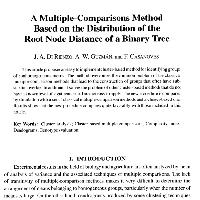Resumen
-
This article proposes an easy to implement cluster-based method for identifying groups of nonhomogeneous means. The method overcomes the common problem of the classical multiple-comparison methods that lead to the construction of groups that often have substantial overlap. In addition, it solves the problem of other cluster-based methods that do not have a known level of significance and are not easy to apply. The new procedure is compared by simulation with a set of classical multiple-comparison methods and a cluster-based one.
Results show that the new procedure compares quite favorably with those included in this article.
